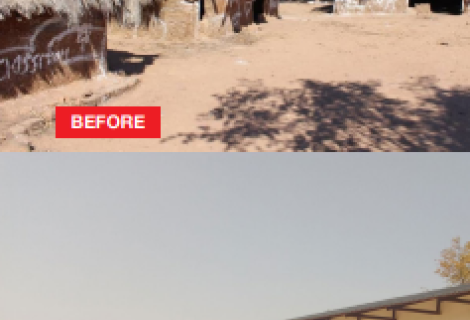SEVEN YEARS LATER AT NJOBOLA PRIMARY SCHOOL

It’s a typical day at Njobola Primary School.
The lunch bell rings, and a small group of girls and boys quickly gather at the assembly point, singing a few songs before dispersing in all directions to head home. Meanwhile, older students chat in smaller groups, their conversations filling the corners of the school grounds. When the bell rings again, everyone returns to their classrooms, and learning continues for the senior grades.
Though the scene may seem familiar, the script is vastly different from 2015, before ActionAid Zimbabwe partnered with Basilwizi under the Local Rights Program to construct four classroom blocks and staff cottages at Njobola. Back then, the school was in a dire state, with lessons taking place in grass-thatched temporary structures that left students exposed to weather elements, making learning a struggle. Teachers had to live in surrounding communities, and those fortunate enough to live near the school were packed into small rooms built by community members.
It was a challenging environment for both learners and teachers.
Today, the story is different. The pass rate at Njobola has gradually risen from a mere 3% to about 22%, a remarkable improvement largely attributed to the construction of the classroom blocks and staff cottages. These developments have significantly enhanced the learning environment and improved education outcomes at the school.
Stella, now a 6th grader, was in ECD A when the school was being constructed, and she vividly remembers the conditions before ActionAid Zimbabwe’s intervention.
“We learned in what looked like shacks. Even then, there weren’t enough, so some of us had to learn outside,” she recalls. While the establishment of Njobola as a satellite school meant she no longer had to walk long distances to school, she is even more excited about the improvements she has witnessed over the years.
“Classrooms make learning easier for us. We can use chalkboards, stick charts on the walls, and we have good storage facilities for our learning materials, unlike back then when things were difficult,” Stella shares. “We are now safe from bad weather. During winter and the rainy season, learning still goes on.”
Mr. Tlou, the school head, expresses his gratitude for the investment by ActionAid Zimbabwe and Basilwizi, noting that it has opened the door for additional support to the school.
“I joined the school soon after the construction of the classroom blocks. Since then, we’ve seen other well-wishers coming in to support us with learning materials, a borehole, a school garden, and latrine facilities with handwashing stations,” says Mr. Tlou.